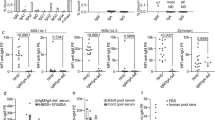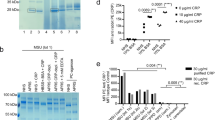Abstract
VAN OSS et al.1 recently reported that aspirin at concentrations of 2.2 × 10−3 M (40 mgm./100 ml.) inhibited the lysis of red cells in a simple complement-hæmolysis reaction, but that sodium salicylate was inactive. This was interesting in view of the therapeutic action of aspirin against diseases such as the rheumatic disorders which are thought to involve immunological phenomena2. Two other related compounds, salicylaldoxime and salicylaldehyde, were earlier reported3 to inhibit red cell lysis in a similar reaction. I therefore investigated the complement-hæmolysis technique since it might usefully predict anti-rheumatic activity in other salicylate derivatives.
This is a preview of subscription content, access via your institution
Access options
Subscribe to this journal
Receive 51 print issues and online access
$199.00 per year
only $3.90 per issue
Buy this article
- Purchase on Springer Link
- Instant access to full article PDF
Prices may be subject to local taxes which are calculated during checkout
Similar content being viewed by others
References
van Oss, C. J., Friedmann, J. C., and Fontaine, M., Nature, 189, 146 (1961).
Anon., Brit. Med. J., i, 565 (Feb. 25, 1961).
Mills, S. E., and Levine, L., Immunology, 2, 368 (1959).
Mayer, M. M., Croft, C. C., and Gray, Margaret M., J. Exp. Med., 88, 427 (1948).
Author information
Authors and Affiliations
Rights and permissions
About this article
Cite this article
ANDERSON, K. Alleged Anticomplementary Effect of Aspirin. Nature 191, 1012–1013 (1961). https://doi.org/10.1038/1911012b0
Issue Date:
DOI: https://doi.org/10.1038/1911012b0
Comments
By submitting a comment you agree to abide by our Terms and Community Guidelines. If you find something abusive or that does not comply with our terms or guidelines please flag it as inappropriate.



